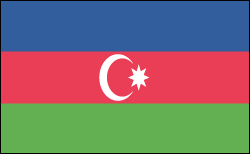- / Countries of the World
- / news and current events
Azerbaijan News & Current Events

Index
- Azerbaijan Profile
- History
- News and Current Events
Tensions Increase with Armenia and Iran
On August 31, 2012, Armenia ended diplomatic relations with Hungary over the return of Ramil Safarov to Azerbaijan. Safarov was convicted of killing Armenian Lieutenant Gurgen Margaryan in 2004 in Hungary. The Hungarian government released Safarov to Azerbaijan on the assumption that he would serve at least 25 years of his life sentence. Upon his arrival in Azerbaijan, Safarov was pardoned. Once news of the pardon hit, protestors in Armenia burned Hungarian flags and threw eggs at the Hungarian Embassy. Demonstrations were also held in Budapest.
Safarov was welcomed back to Azerbaijan as a national hero. A lieutenant at the time of the murder, Safarov was promoted to rank of major and given eight years of back pay. His pardon and warm welcome threatened to break up the peace process between Azerbaijan and Armenia, a process that has kept the two countries from backsliding into violent feud over the disputed Nagorno-Karabakh territory.
Tension also increased between Azerbaijan and Iran throughout 2012. Neighbors along the Caspian Sea, the two countries found themselves at odds over Israel and Armenia. Iran has long been a supporter of Armenia, Azerbaijan's enemy. Meanwhile, Azerbaijan has been cooperating with Israel over military matters. In March 2012, Azerbaijan authorities arrested 22 people who were suspected in an Iranian plot to kill Israeli and American diplomats. As of September 2012, those allegations remained unproven. In May 2012, Iran Chief of State Ayatollah Ali Khamenei was forbidden entry at the Baku airport and border crossings between the two countries were closed for days. Iran sent warships into the Caspian Sea.
Aliyev Wins Third Term, but International Observes Call Election Unfair
On October 9, 2013, presidential elections were held. Incumbent Ilham Aliyev won a third five-year term, taking 84.6 percent of the vote. Jamil Hasanli, a historian and professor, was a distant second with 5.4 percent. In an interview with The New York Times, Hasanli said his chances were hindered by how quickly the election was held, not having enough funds, the state-controlled media and the lack of international interest.
International observers did become involved after the election. The Organization for Security and Cooperation in Europe (OSCE) called the presidential election unfair and said that they had evidence proving voting irregularities such as ballot-box stuffing. The OSCE released a report on October 10, 2013, that said the election was “undermined by limitations on the freedoms of expression, assembly and association that did not guarantee a level playing field for candidates. Continued allegations of candidate and voter intimidation and a restrictive media environment marred the campaign. Significant problems were observed throughout all stages of Election Day processes and underscored the serious nature of the shortcomings.” However, Aliyev's government denied the accusations.
See also Encyclopedia: Azerbaijan .
U.S. State Dept. Country Notes: Azerbaijan
State Statistical Committee www.azeri.com/goscomstat/
